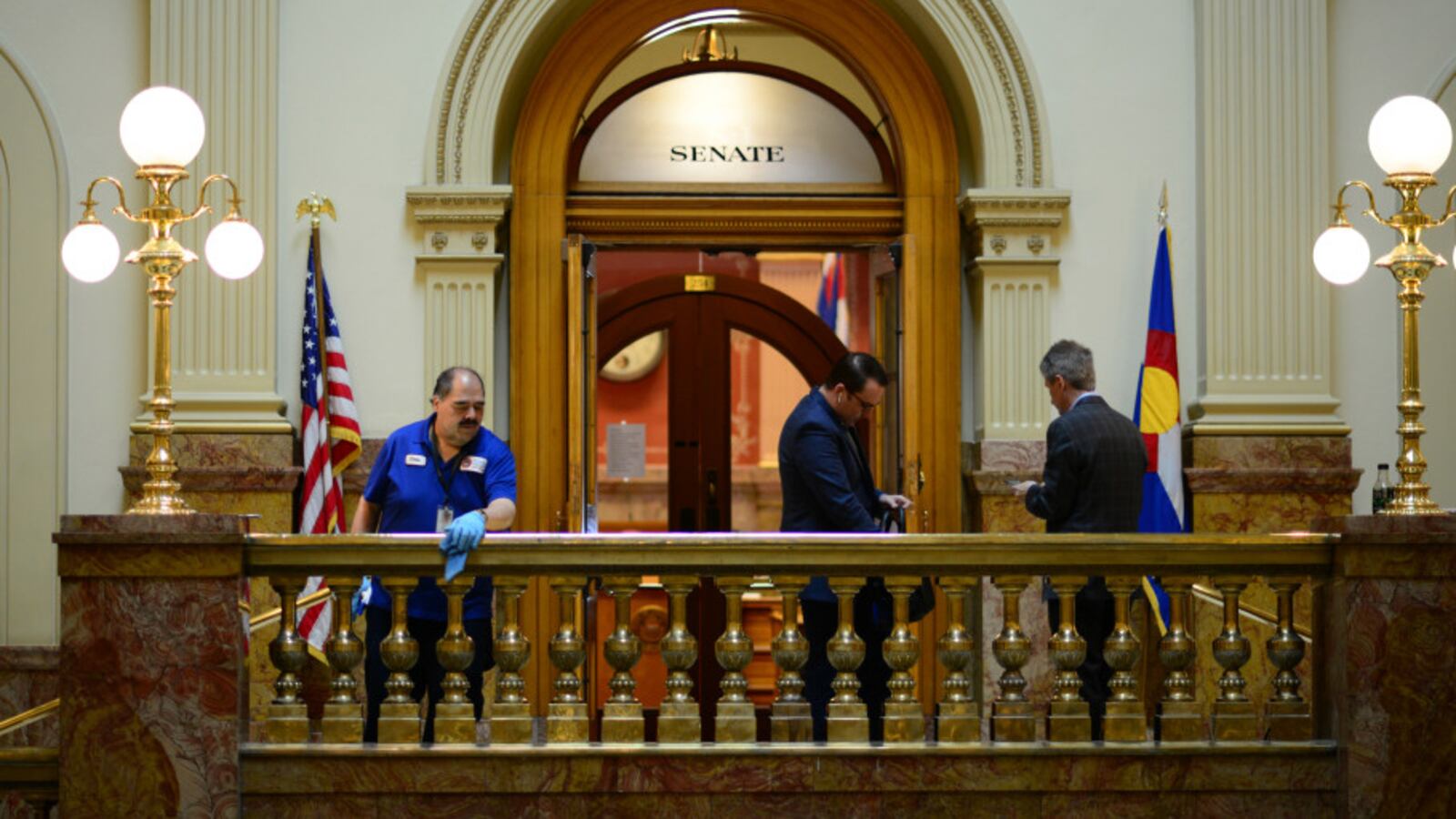Editor’s Note: This article has been updated to reflect that the Joint Budget Committee has put its work on hold at least until April 7.
Colorado schools will be lucky if funding remains essentially flat next year, even as they make dramatic changes to serve their students during statewide school closures.
Colorado lawmakers heard a grim and uncertain economic forecast this week that predicted at least a $750 million hit to the state budget as a result of business closures and unemployment associated with the efforts to slow the spread of the new coronavirus. The state’s ski resorts are closed, and restaurants have had to end dine-in service, leading to widespread layoffs.
It’s not clear yet — and might not be for months — if this is a temporary downturn or if it will lead to a more long-lasting recession.
Adding to the budget woes, the international price of oil has plummeted, reducing revenue from federal mineral leases. And local property tax revenues could drop by more than 5% next year, the economic forecast said, which would require the state to allocate millions of dollars more in the 2021-22 fiscal year to make up the difference under Colorado’s school funding formula.
By national standards, Colorado schools already are underfunded. When regional cost differences are taken into account, the state spends about $2,700 less per student than the national average. The state constitution requires K-12 funding to increase annually at a rate equal to population and inflation, but each year since the Great Recession, the law also has allowed lawmakers to hold back hundreds of millions of dollars. Over the past decade, this maneuver, known as the budget stabilization factor or negative factor, has cost schools more than $8 billion.
Buoyed in part by rising local property tax revenues, Colorado lawmakers have been able to reduce the budget stabilization factor to $572 million this fiscal year. The proposed budget released by Gov. Jared Polis in November would have reduced that amount by another $52 million, and advocacy groups such as the state teachers union had been calling for even more.
Now, Colorado lawmakers will have to dig deep into the general fund just to keep the budget stabilization factor the same, and a legislative analyst asked the Joint Budget Committee if members wanted to consider increasing the withholding. Doing so would require separate legislation.
Democratic leaders in the Colorado General Assembly said they consider K-12 education funding a top priority even as they acknowledged major uncertainty about the budget picture.
“We don’t want to see the budget stabilization factor increase, and it’s something we’re going to prioritize, but in a situation like this, we really don’t know what is going to happen,” Speaker of the House K.C. Becker said in a call with reporters this week.
This uncertainty comes as the state’s schools are being stretched in new ways. Starting last Thursday, many Colorado districts announced closures of two to three weeks in response to the new coronavirus. On Wednesday, Polis ordered all schools to close at least through April 17. Districts have set up food distribution sites and rolled out online learning plans with varying degrees of thoroughness.
Jim Carpenter, chief financial officer for Denver Public Schools, said the district’s top priorities right now are ensuring students and their families get food and preparing for online learning.
While the district is spending less on food overall than it did when school was in session, officials don’t yet know how much of the ongoing cost will be reimbursable, and the district isn’t collecting any lunch money from families who used to pay.
The district is also ordering 9,000 new Chromebooks for students who don’t have computers, while continuing to pay all staff who were previously scheduled to work.
“This is why you have reserves,” Carpenter said.
As for next year, the district is closely monitoring state discussions and planning on a conservative budget at the local level, he said.
Education advocates fear not all districts will weather this crisis equally.
“As an organization that has been very focused on the deep inequities that already exist in how we fund schools and students, this crisis will make those inequities even clearer,” said Leslie Colwell of the Colorado Children’s Campaign. “There will be some schools that don’t miss a beat, and there will be some that really struggle for the foreseeable future.
“As all of the needs of kids and families are increasing, the best-case scenario is that funding could stay flat.”
The Joint Budget Committee has postponed further budget discussions until at least April 7. The Colorado General Assembly has gone into recess to help slow the coronavirus. While the legislature is scheduled to come back March 30, it’s not clear that regular business will resume. Passing a balanced budget is the one act the Colorado constitution requires of legislators, and it typically takes about two weeks to move through the House and Senate.
“Between the challenges of balancing a budget with a constantly changing economy and the additional public health considerations during the pandemic, we feel it is necessary to put our budget-making on pause while we get a clearer picture of where things stand,” state Rep. Daneya Esgar, a Pueblo Democrat and chair of the Joint Budget Committee, said in a press release. “Our communities, businesses, and state and local governments are dealing with a pandemic, and we have to be able to respond appropriately to the needs across the state. The situation continues to evolve, and we want to ensure we’re making final budget decisions with the best information possible under these challenging circumstances.”

